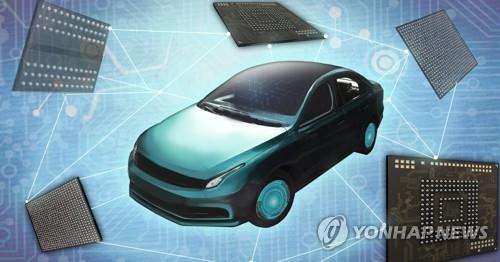Input 2021-02-08 05:43 | Revision 2021-02-08 09:57

In the aftermath of a decrease in production due to Corona 19 last year, there are signs that the ransom price for vehicle semiconductors will increase this year. Amid a shortage of automotive semiconductors, Taiwan TSMC, the world’s largest foundry, is considering raising the price of automotive semiconductors by up to 15%, and there are signs that such an atmosphere will spread.
In addition, sales of next-generation mobility, such as autonomous vehicles and electric vehicles, will expand, and the price of semiconductors for vehicles installed in new cars this year is expected to exceed $550 (about 620,000 won) on average.
According to IC Insights, a market research company on the 7th, the automotive semiconductor market this year is expected to grow 16% compared to last year and record a large growth rate in the semiconductor field after memory semiconductors such as DRAM and NAND flash.
Memory semiconductors and automotive semiconductors are the only sectors that are expected to sustain double-digit growth this year in the overall semiconductor market. Among them, automotive semiconductors currently occupy 10% of the total semiconductor market, and the scale itself is not large, but in terms of growth rate, it is drawing attention as it is expected to be comparable to memory.
Recently, the automotive semiconductor market is attracting more attention as a’shortage phenomenon’, which leads to a shortage of supply. The finished car industry, which had reduced demand and production disruptions due to Corona 19 last year, naturally reduced orders for automotive semiconductors. In line with this, semiconductor manufacturers are responding first to other semiconductor demanders such as PCs, smartphones, and servers, which have surged in demand due to Corona 19, and the supply of semiconductors for vehicles has decreased.
In addition, for semiconductor companies, they had to quickly reduce the production of semiconductors for vehicles, which are relatively low-margin, and invest capital where there is immediate demand. It wasn’t until last fall that the production of finished cars was on track again, and the need to produce semiconductors for vehicles began to emerge.
However, when automakers started wanting to supply semiconductors for you and me, the shortage phenomenon was already announced. Currently, GM, the largest automobile company in the United States, has shut down three US factories due to a shortage of semiconductor supplies, and has started production cuts at its factories in Korea. In addition, major automakers such as Volkswagen, Audi, Ford, Honda, and Toyota are producing only major models because it is difficult to install semiconductors on all models.
In addition to Taiwan’s largest foundry company TSMC, the Netherlands NXP, which is the second and third largest in the automotive semiconductor market, and Japan’s Renesas have also started to expand production again, but this time the price problem is raised.
According to foreign media, TSMC has shown its willingness to increase the price of automotive semiconductors by up to 15% from the end of this month, and the second and third-ranking companies will join in the procession one after another. In the end, even if the issue of supplying semiconductors for vehicles is resolved, there is a risk of another obstacle to the production of finished cars due to the price hike of the top three companies.
It has also been observed that this year, semiconductors for vehicles will increase the ransom price, and the number of semiconductors installed in next-generation mobility such as autonomous driving and electric vehicles will increase, and the cost of semiconductors for a single new vehicle will exceed $550.
IC Insights predicted that the average price of semiconductors installed in a single new vehicle as of this year will rise to more than $550 as of this year due to the lack of supply of semiconductors for vehicles and the expansion of sales of autonomous vehicles and electric vehicles.
Current internal combustion engine cars require about 200 to 300 semiconductors. On the other hand, it is estimated that up to 2,000 semiconductors for vehicles will be installed in autonomous vehicles, and it is expected that more than 10 times the current semiconductors will be required even with simple calculations.
It is known that Apple is reviewing the development of self-driving electric vehicles recently, and the need to prepare in earnest in the era of self-driving cars is also emerging. In line with this, Samsung Electronics, which is a comprehensive semiconductor company but rarely produces automotive semiconductors, is also attracting attention as the possibility of large-scale mergers and acquisitions (M&A) targeting global automotive semiconductor companies.
Press release and article report [email protected]
[자유민주·시장경제의 파수꾼 – 뉴데일리 newdaily.co.kr]
Copyrights ⓒ 2005 New Daily News-Unauthorized reproduction, redistribution prohibited
recommendation
Related Articles It’s great to read it with the article you just saw!
Vivid
Headline news Meet this visual news.
